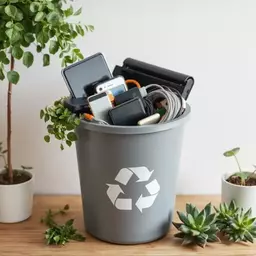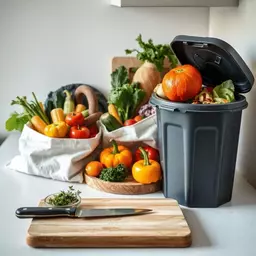In a world filled with choices, how often do we stop to consider the impact of our purchases? Mindful consumption encourages us to reflect on our habits, empowering us to make choices that benefit both ourselves and the planet. By embracing this practice, we can contribute to a sustainable future without feeling overwhelmed.
What You Will Learn
- Understanding the principles of mindful consumption: awareness, intentionality, and sustainability.
- Recognizing the benefits of mindful consumption, including reduced waste and improved financial health.
- Exploring practical strategies to cultivate mindfulness in your shopping habits.
- Learning from real-life community initiatives that promote sustainable consumption practices.
- Addressing misconceptions about mindful consumption and how it can fit into everyday life.
- Discovering steps to start your journey towards mindful consumption today.
Benefits of Practicing Mindful Consumption
Understanding the various advantages of mindful consumption can help reinforce its importance in our daily lives. Below are key benefits highlighted for visual comparison.
Reduced Waste
Focusing on what we truly need helps minimize unnecessary purchases and waste.
Better Financial Health
Being intentional with spending can lead to savings and smarter financial choices.
Enhanced Well-being
Mindful consumption often promotes a higher quality of life, investing in experiences that truly matter.
Community Engagement
Encouraging friends and family to reflect on their habits creates a supportive network for change.
Understanding Mindful Consumption and Its Importance
In our fast-paced world, it’s easy to get caught up in the frenzy of shopping and consumption without really thinking about what we need. That’s where mindful consumption comes in. It’s about being aware of our choices and understanding the impact they have on our lives and the environment. At Eco Habits Daily, I believe that practicing mindful consumption is not just a trend; it's a necessity for creating a sustainable future.
Think about it: when we make conscious choices, we not only benefit ourselves but also contribute to a healthier planet. Every time we choose to buy less or select eco-friendly products, we're participating in a larger movement toward sustainability. This isn't just about being *green*—it's about being smart with our resources, enhancing our quality of life, and supporting ethical practices.
Defining Mindful Consumption: A Modern Necessity
So, what exactly does mindful consumption mean? It involves being intentional with our purchases—considering their necessity, origin, and the consequences they carry. Here are some key points to help clarify this concept:
- **Awareness:** Recognizing our consumption habits and patterns.
- **Intentionality:** Making purchases based on needs rather than impulsive desires.
- **Sustainability:** Choosing products that are environmentally friendly and ethically sourced.
By embracing these principles, we can shift our mindset from mindless to mindful, fostering a more sustainable lifestyle that aligns with our values. It’s a powerful way to connect our daily choices with a broader commitment to the environment. For those looking to declutter responsibly, exploring responsible decluttering best practices can be a great starting point.
Key Benefits of Practicing Mindful Consumption
Practicing mindful consumption comes with a myriad of benefits that can enrich our lives in several ways. Here are a few key advantages:
- **Reduced Waste:** Focusing on what we truly need helps minimize unnecessary purchases and waste.
- **Better Financial Health:** Being intentional with spending can lead to savings and smarter financial choices.
- **Enhanced Well-being:** Mindful consumption often promotes a higher quality of life, as we invest in experiences and products that truly matter to us.
At Eco Habits Daily, I’ve seen firsthand how these benefits can have a ripple effect, encouraging friends and family to reflect on their consumption habits. When we prioritize mindful choices, we elevate not just our lifestyle but also those around us!
Frequently Asked Questions About Mindful Consumption
What exactly is mindful consumption?
Mindful consumption involves being aware and intentional about your purchasing habits, considering the necessity, origin, and environmental impact of your choices.
What are the primary benefits of adopting mindful consumption?
Key benefits include reduced waste, improved financial health, enhanced personal well-being, and a positive impact on the environment and community.
How can I start practicing mindful consumption today?
Begin by reflecting on your current shopping habits, making a conscious commitment to buy less, choosing eco-friendly products, and supporting ethical brands.
What if I find mindful consumption too difficult or expensive?
Start with small, manageable changes that fit your lifestyle and budget. Focus on one area at a time, and remember that every little bit helps. Mindful consumption is about progress, not perfection.
The Role of Mindfulness in Consumption Choices
Mindfulness plays a crucial role in shaping our consumption choices. By practicing mindfulness, we develop a deeper understanding of how our decisions affect the world around us. Here’s how you can cultivate mindfulness in your consumption:
- **Pause and Reflect:** Before making a purchase, take a moment to ask: Do I really need this? How will it benefit me?
- **Educate Yourself:** Learn about the origins of the products you buy and the companies behind them.
- **Practice Gratitude:** Appreciate what you already have, which can help curb impulsive buying urges.
By integrating mindfulness into our shopping habits, we create a more thoughtful approach to consumption. This journey not only leads to personal fulfillment but also contributes to a more sustainable world, aligning perfectly with the mission of Eco Habits Daily.
Quick Summary
Here’s a brief recap of the key points discussed so far:
- Mindful Consumption Defined: It involves being intentional with our purchases, focusing on necessity and sustainability.
- Key Benefits: Practicing mindful consumption leads to reduced waste, better financial health, and enhanced well-being.
- Community Impact: Local initiatives and personal transformations showcase the positive ripple effects of mindful consumption.
Real-Life Examples of Mindful Consumption Impact
One of the best ways to understand the power of mindful consumption is through real-life examples. Communities worldwide are embracing this approach, leading to impactful changes. I often find inspiration in local initiatives that promote sustainability and encourage residents to think critically about their purchasing habits. These stories not only highlight the positive outcomes of mindful practices but also show how they can ripple through society.
Consider community-led movements that organize regular events aimed at raising awareness about sustainable choices. These initiatives often involve workshops, local markets, and educational programs. They provide a platform for individuals to come together, share experiences, and learn from one another, creating a tight-knit community focused on eco-friendly living.
Case Study: Community Initiatives Promoting Mindful Practices
Take a look at successful community initiatives that have transformed consumption habits. For example, several neighborhoods have started 'buy-nothing' groups, where members share items instead of purchasing new ones. This practice encourages resourcefulness and helps reduce waste. Here are some other notable initiatives:
- Local swap events that promote exchanging goods, reducing the need to buy.
- Workshops on DIY cleaning products to lessen reliance on single-use plastics.
- Community gardens that empower members to grow their own food, fostering sustainable practices.
These initiatives are often spearheaded by passionate individuals or organizations dedicated to creating a more sustainable future. They show us that mindful consumption can be a collective effort, amplifying the message of Eco Habits Daily and encouraging others to join the movement!
Personal Stories: Transformations Through Mindful Consumption
Personal stories can be incredibly powerful. Many individuals have shared their journeys toward mindful consumption, showcasing how small changes can lead to significant transformations. For instance, one person may start by replacing plastic bags with reusable ones. Over time, they might also shift to buying in bulk, choosing second-hand items, or even adopting a plant-based diet! These individual journeys reveal the profound impact that mindful choices can have on both personal well-being and the environment.
Here are some common transformations people experience:
- Improved mental clarity and reduced anxiety around shopping decisions.
- Increased satisfaction from making thoughtful purchases rather than impulse buys.
- A deeper connection to the community through local sourcing and sharing.
These stories remind us that we are not alone on this journey. At Eco Habits Daily, we celebrate every step taken toward a more sustainable lifestyle! For additional tips, consider exploring easy eco-friendly habits to start.
Impact of Community Supported Agriculture (CSA) on Local Mindful Consumption
Community Supported Agriculture (CSA) programs are a fantastic example of mindful consumption in action. These programs connect consumers directly with local farmers, allowing people to purchase seasonal produce and share in the harvest. It’s like having a little piece of the farm right in your community!
Participating in a CSA offers numerous benefits:
- Fresh, organic produce that supports local agriculture.
- Reduced carbon footprint from shorter transportation distances.
- Stronger community ties through shared experiences in growing and consuming food.
When you join a CSA, you embrace the idea of eating with the seasons, which can lead to healthier eating habits and a more profound appreciation for food. It’s a wonderful way to practice mindful consumption while enjoying delicious, fresh ingredients!
Addressing Common Questions and Misconceptions about Mindful Consumption
As we dive deeper into mindful consumption, it’s essential to address some common questions and misconceptions that often arise. Many people are eager to embrace this lifestyle but may feel overwhelmed by the many choices or unsure where to start. By clarifying these points, we can empower more individuals to make conscious decisions.
One common misconception is that mindful consumption requires a complete overhaul of one’s lifestyle. In reality, it’s about making small, intentional changes that fit into your life. Remember, every step counts! At Eco Habits Daily, we believe in the power of incremental change and the importance of personal journeys.
What Are the Misconceptions Surrounding Mindful Consumption?
Here are some misconceptions that often come up regarding mindful consumption:
- Mindful consumption is expensive and only for wealthy individuals.
- It requires a drastic change in lifestyle overnight.
- Mindful consumers can't enjoy convenience in their choices.
Understanding these misconceptions allows us to approach mindful consumption with more clarity and confidence. It’s about finding a balance that works for you!
How Can I Start Practicing Mindful Consumption Today?
Starting your journey toward mindful consumption can be easier than you think! Here are some steps to help you begin:
- Reflect on your current shopping habits and identify areas for improvement.
- Make a commitment to be more conscious about your purchases.
- Start small—choose one area of your life to focus on, such as reducing plastic use.
Remember, every small step you take contributes to a larger impact. Each change is an opportunity to align your choices with your values!
Understanding the Importance of Brand Transparency and Consumer Education
Brand transparency is crucial in today’s world. As consumers, we have the right to know where our products come from and how they are made. This knowledge helps us make informed decisions and supports brands that align with our values. For those interested in reducing waste, recycling tips for your home can be a great starting point.
Here are some important aspects to consider:
- Research brands that prioritize sustainability and ethical practices.
- Look for certifications that indicate responsible sourcing.
- Engage with brands on social media to understand their practices better.
As we become more educated consumers, we empower ourselves and encourage brands to adopt more transparent practices. Together, we can foster a market driven by mindfulness and sustainability!
Encouragement to Begin Your Mindful Consumption Journey
As we wrap up this discussion on mindful consumption, I want to encourage you to take that first step. It may seem daunting, but remember: change doesn’t happen overnight. By implementing a few key takeaways, you can start a meaningful journey toward a more sustainable lifestyle today!
Key Takeaways to Implement Immediately
Here are some simple actions you can take right now:
- Evaluate your shopping list and consider what you truly need.
- Choose to purchase from local or ethical brands whenever possible.
- Practice gratitude for what you already have, reducing the desire for more.
These small changes can significantly impact your life and the planet!
Join a Community of Mindful Consumers: Resources and Support
Don’t forget that you’re not alone on this journey. Joining a community focused on mindful consumption can provide invaluable support and resources. Here are some ideas for connecting with others:
- Participate in local sustainability groups or online forums.
- Attend workshops on eco-friendly practices.
- Follow social media accounts dedicated to sustainable living for inspiration.
At Eco Habits Daily, we’re committed to fostering a community that prioritizes mindful consumption and environmental responsibility!
Exploring the Benefits of Mindful Eating and Plant-Based Diets
Finally, let’s talk about mindful eating! Adopting a plant-based diet can be a powerful way to practice mindful consumption. Not only does it benefit your health, but it also reduces your ecological footprint. Here’s how to get started:
- Try incorporating more plant-based meals into your diet each week.
- Plan your meals to minimize food waste and maximize freshness.
- Consider the source of your food and prioritize local, seasonal options.
Mindful eating is about savoring each bite and making intentional choices. It’s a wonderful way to connect with the food you consume and the earth it comes from!
Recap of Key Points
Here is a quick recap of the important points discussed in the article:
- Mindful Consumption Definition: It's about being intentional with purchases, considering necessity, origin, and consequences.
- Benefits: Practicing mindful consumption leads to reduced waste, better financial health, and enhanced well-being.
- Mindfulness Practices: Pause and reflect before purchases, educate yourself about products, and practice gratitude for what you have.
- Community Impact: Community initiatives, such as buy-nothing groups and local swap events, promote sustainable habits.
- Overcoming Misconceptions: Mindful consumption doesn't require drastic changes—small, intentional steps are effective.
- Brand Transparency: Research brands for sustainability, look for certifications, and engage with companies about their practices.
- Mindful Eating: Incorporate more plant-based meals and prioritize local, seasonal foods to enhance your mindful consumption journey.










